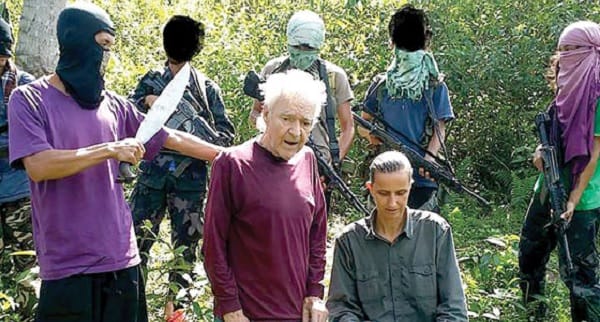At the end of September, the Abu Sayyaf group in the Philippines announced they were holding a German man and woman hostage. The group also threatened to kill one of their captives by October 17 unless their demands were met – including Germany’s withdrawal from the US-led coalition against the Islamic State of Iraq and Syria (ISIS). But Philippine authorities have been quick to argue that despite Abu Sayyaf’s professed allegiance to ISIS, the group is made up of only criminals or bandits, not religiously-motivated terrorists.
Philippine officials say there is no evidence of actual links between Abu Sayyaf and ISIS. According to the Philippines, Abu Sayyaf is only capitalising on the current high profile of ISIS, so they can demand a higher cash ransom for their captives. Aside from their political demands, the hostage-takers have asked for some 250 million Philippine Pesos (S$7.1 million) as ransom. Hostage-taking for profit is an established modus operandi for the group – the Abu Sayyaf faction holding the Germans hostage also currently have other captives, including Dutch and Swiss citizens kidnapped over two years ago. Another Abu Sayyaf faction is also currently holding two Malaysians captive.
The situation illustrates how dealing with groups like Abu Sayyaf is a delicate issue for governments in Southeast Asia. The threat posed by Abu Sayyaf gunmen must be taken seriously, and the Philippines has intensified its manhunt to locate Abu Sayyaf camps in Mindanao. However, their claims to represent a wider pan-Asian Jihadist movement cannot be accepted at face value.
At the end of September, the foreign ministers of the Association of Southeast Asian Nations (ASEAN) released a joint statement condemning ISIS. This followed a meeting with US Secretary of State John Kerry on the sidelines of the UN General Assembly. Mr. Kerry thanked the ASEAN ministers “for supporting the global effort to stop the spread of foreign terrorist fighters”. Despite these moves, several commentators, especially in the American media, have argued that Asians need to do more. Thus far, no Asian country has joined the US-led military intervention against ISIS. But taking action against Islamic extremism remains a sensitive issue for Asian states with Muslim majorities or sizable minorities.
Sources:
Abu Sayyaf sticks to Oct 17 ‘beheading’ deadline for German hostages [Borneo Post, 8 Oct 2014]
ASEAN issues first joint statement on ISIS crisis [The Straits Times, 28 Sep 2014]
Photo Credit: World Analysis




